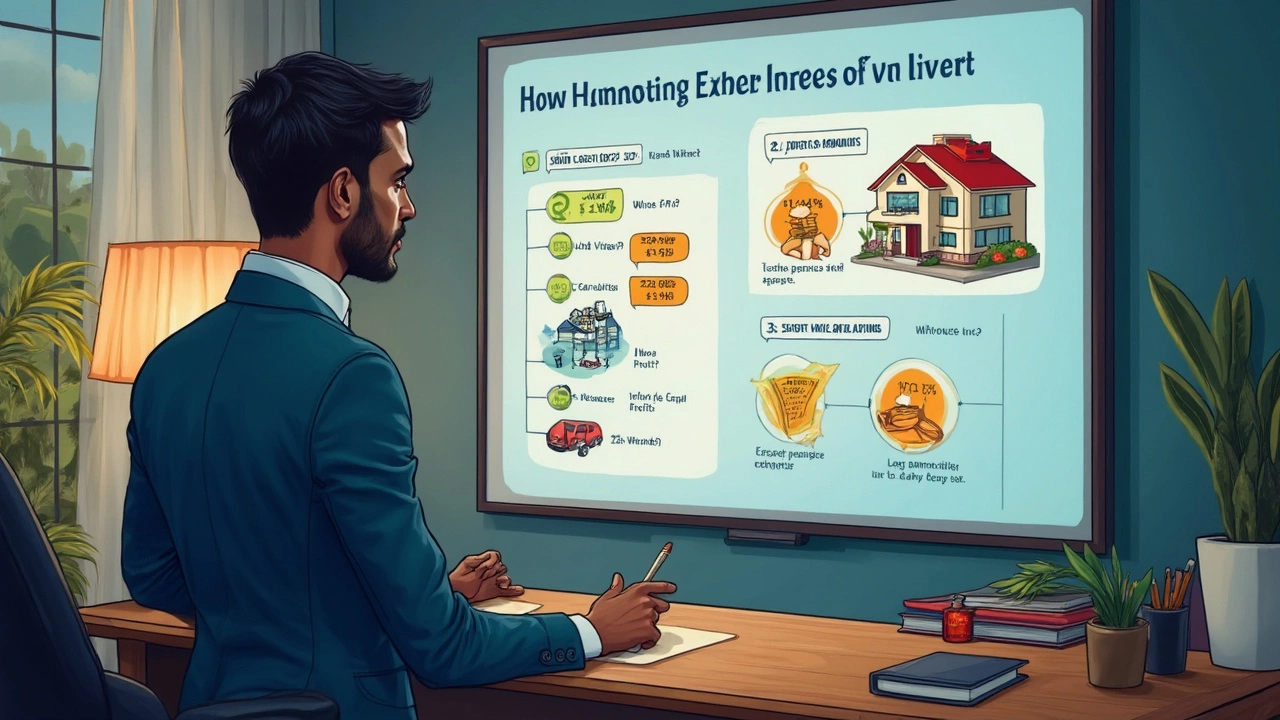Ever buy something online and realize later you missed a hidden fee? That’s nothing compared to the surprises waiting in rental property profits. Making real money—a steady, monthly profit you can actually use—starts way before you sign anything. You’ve got to be laser clear on what “profit” even means in the rental world.
Most people focus on the headline rent, but that’s just the surface. Let’s get straight to the point: true profit is what’s left after every last expense, from repairs to taxes. Landlords who nail this math don’t just survive—they thrive, even when the market gets weird.
So before you even think about chasing big returns or expecting money to roll in, let me show you how to figure out what’s really enough to make a rental worth your time—especially if you’re doing it all online, from a distance, like more and more people today.
- Crunching the Numbers: What Counts as 'Profit'?
- The 1% Rule and Rental Yield Explained
- Expenses: Where Your Money Actually Goes
- Online Property Buying: What’s Different?
- Maximizing (and Protecting) Your Margins
- Getting Ahead: Tips from Real Landlords
Crunching the Numbers: What Counts as 'Profit'?
Here’s where a lot of people trip up: seeing the monthly rent check and thinking it’s all pure profit. As much as I wish that were true, it’s not. What really matters in rental property profit is what’s left after you subtract every single expense—not just the obvious ones.
Start with your rent income, sure. But then you need to hack away:
- Mortgage payments (if you’ve got a loan)
- Property taxes (these can go up over time)
- Insurance (landlord policies cost more than regular home insurance)
- Repairs and maintenance (leaky pipes happen when you least expect it)
- Vacancy costs (no tenant = no rent, even for a month or two out of the year)
- Property management fees if you hire help, especially common when you buy property online
- HOA fees (if any)
After all these, what’s left is your true profit (cash flow). And you definitely want that number to stay in the black every single month.
"Don’t just look at gross rent. Investors who overlook all-in expenses often regret it fast,” warns Brandon Turner from BiggerPockets.
Let’s be real: Very few rental properties spit out thousands each month from the start. One rule of thumb many seasoned landlords use? Aim for at least $100 to $300 per unit per month after all expenses, or shoot for a 6%–10% annual rental yield. That’s the cash flow sweet spot that covers your butt when repairs or vacancies pop up.
| Item | Monthly Cost (Example) |
|---|---|
| Mortgage | $1,200 |
| Taxes | $200 |
| Insurance | $100 |
| Repairs (avg) | $100 |
| Vacancy allowance | $80 |
| Management fees | $120 |
So if you’re pulling in $2,200 in rent, and all those expenses add up to $1,800, you’re pocketing $400. That’s your real profit, not just a number in a spreadsheet. Get this right, and your real estate investing journey gets a whole lot less stressful.
The 1% Rule and Rental Yield Explained
Search for advice about buying a rental property and you’ll see the 1% rule come up a lot. It’s pretty straightforward: take the purchase price of the property, move the decimal two spots to the left, and that’s roughly what you want in monthly rent. For example, buy a house for ₹50 lakh, and rent should be at least ₹50,000 a month. If you hit that, the property could be a decent investment—at least on paper.
But why does this rule get so much attention? Basically, it helps you weed out rentals that just won’t pay the bills—and gives you a fast benchmark before you deep-dive into the math. If a home rents for way less than that 1%, you’re probably looking at razor-thin margins—or losses—especially after accounting for all the hidden expenses.
Alongside the 1% rule, smart landlords talk about rental yield. Here’s the quick-and-dirty formula: take your yearly rent income, divide it by the property’s price, and multiply by 100 to get a percentage. Say you score ₹6 lakh a year in rent on a ₹50 lakh place? Your rental yield is 12%—which is excellent for most cities in India. The national average hovers closer to 2-4%, especially in expensive cities like Mumbai or Bangalore.
| City | Average Apartment Price (₹ lakh) | Average Monthly Rent (₹) | Estimated Annual Yield (%) |
|---|---|---|---|
| Mumbai | 100 | 30,000 | 3.6 |
| Bangalore | 80 | 22,000 | 3.3 |
| Pune | 60 | 15,000 | 3.0 |
| Indore | 40 | 12,000 | 3.6 |
Rental yields look small, but don’t ignore them. If you’re going to buy property online, you need a good yield or that rental property just won’t pull its weight. Some pros chase higher yields in up-and-coming towns because that’s where the numbers really work, even if the headline rent is smaller.
The takeaway? The 1% rule gets you a quick answer, but rental yield gives you the real picture, especially if you compare cities. Use both to spot true opportunities when searching listings on property websites. If the numbers don’t add up from the start, no amount of fancy features or location hype matters.
Expenses: Where Your Money Actually Goes
People always talk about the dream of passive income with rental properties, but let's get real—expenses can eat up your profit faster than you expect. It’s not just the mortgage. The big mistake rookie landlords make is skipping over the “hidden” costs that come with owning a rental property.
Here’s a peek at where your money will actually go, every month and every year:
- Mortgage Payments: This is your biggest expense. It pays down your loan, but barely dents most people’s monthly rent.
- Property Taxes: Local governments don’t mess around. Taxes can jump each year, especially in “hot” markets. In India, for example, property tax rates usually range from 0.2% to 2.5% of property value per year.
- Insurance: Landlord insurance costs more than regular homeowners. It covers liability and damages, not just structure. In 2024, landlord insurance in India averaged ₹5,000–₹12,000 annually for a regular flat.
- Maintenance and Repairs: Stuff breaks. Tenants call at 11 pm. Paint, plumbing, appliances—plan for at least 1% of the property’s value per year if you want to keep things running smoothly.
- Vacancy Costs: Even the best tenants leave. Every vacant month is pure loss, plus you might pay for deep cleaning or painting before the next person moves in.
- Property Management Fees: If you don’t want late-night calls, a manager takes over. But they’ll charge 7–10% of the monthly rent on average.
- Online Platform Fees: If you use a buy property online platform, check for extra listing, transaction, or legal service charges. These are newer but becoming common as more deals are done digitally.
- Utilities and Society Charges: Sometimes you cover water, trash, or security, especially with short-term rentals or in managed societies. Don’t assume tenants always pay.
Cash Flow Tip: When you add up all these expenses, you might see your profit—what’s left of your rent—shrink to 6% to 8% of the property price yearly, even in great areas. That’s before taxes on your income, too. A lot of first-time buyers only see the rent-to-mortgage gap and miss everything else. Always check the real math before buying.
| Expense Type | Typical Share of Rent |
|---|---|
| Mortgage | 50-60% |
| Property Taxes | 10-12% |
| Insurance | 2% |
| Repairs/Maintenance | 5-10% |
| Vacancy | 5% |
| Management Fees | Up to 10% |
Bottom line: your real rental property profit is about what’s left after all this, not just what you collect in the first week of the month.

Online Property Buying: What’s Different?
Buying a rental property online isn’t just about convenience—it completely flips the process from old-school in-person deals. First off, you get way more choices in way less time. Sites list dozens or even hundreds of options, letting you compare prices, neighborhoods, and rent estimates in minutes. But you also have less face-to-face time and fewer chances to spot problems early. That’s where most people mess up their expected rental property profit.
Here’s the trick: with online platforms, you’re working with digital photos, remote tours, and data sheets instead of walking through a home with your own eyes. Sometimes, what’s in the pictures isn’t the whole story. For example, those glossy photos usually don’t show the leaky roof or outdated wiring that eats up your rental yield the first year.
Platforms typically charge transaction fees, and some have monthly management add-ons if you want a "hands-off" property. Sure, these services can be lifesavers—especially if your property is in a city nowhere near you—but it cuts into your bottom line fast. Before choosing, check for:
- Listing fees, service charges, and closing costs.
- Limited ability to negotiate on price (many online marketplaces set firm pricing).
- Less wiggle room to catch red flags—always budget for a pro inspection, even if it’s extra.
Online buying also means data, lots of it. Sites share rental history, crime rates, school ratings, and neighborhood demand. You can spot trends, but there’s a catch: you might miss subtle things, like a noisy construction project planned next door or weird HOA rules buried in the fine print.
| Traditional Buying | Online Buying |
|---|---|
| In-person tours | Virtual tours, photo/video walkthroughs |
| Negotiation flexibility | Standardized prices, limited negotiation |
| Personal connection with realtor | Automated or remote service |
| Manual paperwork | E-signature & digital docs |
| Local market knowledge | Access to national data sets, reviews |
The upside? Buying a rental property online can save weeks of searching and haggling, and you get transparency about sale history and expected rent. The downside? If you don’t read every detail or skip third-party inspections, problems pop up only after you close—by then, your rental property profit takes a hit. So, double-check the fine print, look up the platform’s reviews, and never skip that independent walkthrough if you can help it.
Maximizing (and Protecting) Your Margins
If you want your rental property profit to actually show up in your bank account, protecting your margins is just as important as growing them. The sad truth: lots of landlords get sloppy after the first deal. They forget about rising repair costs, accidental vacancies, or surprise taxes, and suddenly that "safe bet" looks risky. Let’s talk practical ways to shield and boost your profits, especially if you buy property online and can’t check the place every week yourself.
First off, put every expense under a microscope. Stuff like HOA fees, property tax hikes, and maintenance emergencies eat away at your numbers. I remember Rohan asking, “Why are we fixing the sink again?” Turns out, one leaky faucet can easily turn a profit month into a loss. Don’t leave these costs to chance.
- Rental yield is king. Always check if your returns (after all costs) hit at least 6-8% per year. Less than that, and it’s usually not worth the hassle—unless your area is booming in property prices.
- Get good at screening tenants. Missed rent is a killer, and non-payers spike your costs fast. A study by Rentec Direct in 2024 showed the average eviction takes 34 days and costs landlords over $3,500 in lost rent and fees. That’s a margin destroyer.
- Set up a "rainy day fund." If you own rental property, expect things to break—not just maybe, but when you least want it. Experts suggest putting aside 1-2% of your property’s value every year for repairs.
Landlords who go digital—buying property online—need a strong local network. Get a trusted property manager, handy-person, and reliable cleaner. Paying a pro to handle stuff is better than last-minute travel or stress. It keeps your rental property profit flowing without unexpected drama.
If you do get a few good years without issues, don’t get lazy. Review your numbers yearly, shop for better insurance, and check if your rent’s still at market rate. Little adjustments protect your margins from shrinking as costs go up.
| Expense | Low | High |
|---|---|---|
| Maintenance | $1,000 | $2,000 |
| Property Tax | $800 | $2,200 |
| Insurance | $500 | $1,200 |
| Vacancy Loss | $500 | $1,500 |
Bottom line: treat your rental yield like a business, not a side hustle. The right habits now save you headaches and protect your real income long term.
Getting Ahead: Tips from Real Landlords
If you ever talk straight to folks who own rental property, you’ll notice they share what actually works—not just the glossy stories. It’s not all passive income and easy money. These are tips you probably won’t hear from a real estate salesperson, but they matter for your bottom line, especially if you’re looking to buy property online.
First, every landlord I know keeps a rainy-day fund. Call it repairs, call it a “crap happens” stash—budget at least one month’s rent per year for maintenance, whether the place is old or brand new. One survey from 2023 showed landlords spent an average of 9% of annual rent income just on maintenance. Think leaky taps, broken heaters, or repainting after tenants move out—that stuff adds up.
Second, don’t skip screening tenants. I’ve made the mistake myself; nothing kills your cash flow like unpaid rent or property damage. Great landlords use digital screening tools now—it’s cheap, and better than gut feeling. It’s way easier to say no to a bad apple before they move in, than to fix things later.
Here’s an actual rental property profit breakdown I got from an online property investor who rents out three units in Hyderabad:
| Monthly Rent | Monthly Expenses (Avg) | Net Profit |
|---|---|---|
| ₹22,000 | ₹7,500 | ₹14,500 |
He sets aside ₹2,500 of that profit every month just for future repairs. That means his real, usable profit is ₹12,000—not the ₹14,500 you see at first glance. Small moves like this keep things stress-free in the long run.
Other tried-and-tested tactics?
- Raise rent a little each year, but keep it fair. Tenants are more likely to stay, and you cover rising costs.
- Use tech for payment and repairs. Online portals cut down on late payments and keep records legit—handy when tax season hits.
- If you buy property online, don’t just trust pictures. Pay for an independent inspection if you’re not local.
- Always run the numbers after every expense, including your time. Some landlords miss out because they forget to value their own hours.
- Keep your expectations real. The typical rental yield in India floats between 2-4% in metros, so chasing 10% is usually a red flag or a sign of hidden risk.
Most landlords who last the distance treat it like a business, not a hobby. That means keeping records, planning for bad months, and making small upgrades—like a water purifier or extra security—that make tenants stay longer. Trust me, you’ll thank yourself for putting these simple but smart habits in place. It’s what separates the folks who earn boring, steady profit from the ones always fighting fires.






